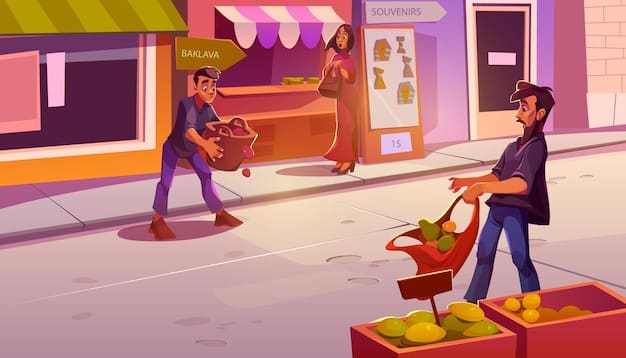GTA VI’s Economy: Realistic or Grind? Unpack the Future.

The highly anticipated Grand Theft Auto VI is poised to redefine open-world gaming, with its economic model standing at a crucial crossroads between offering a genuinely intricate, player-driven realism and succumbing to the established pattern of repetitive, grind-focused progression seen in many modern titles.
The gaming world eagerly awaits its next monumental release, and few titles generate as much fervent speculation as Grand Theft Auto. With whispers circulating and anticipation building, one of the most compelling questions revolves around GTA VI’s economy: will it be more realistic or just another grind? This pivotal aspect could fundamentally reshape the player experience, determining whether we are immersed in a living, breathing digital world or trapped in an endless pursuit of digital currency.
the evolution of in-game economies: from san andreas to gta online
Understanding the potential trajectory of GTA VI’s economic system requires a look back at its predecessors. The Grand Theft Auto series has always featured some form of in-game economy, allowing players to earn money, purchase assets, and engage in various illicit or legitimate ventures. From the relatively simple, linear progression of early titles to the sprawling, constantly evolving digital marketplace of GTA Online, Rockstar has consistently pushed the boundaries of how players engage with virtual wealth.
Early GTA games, like Grand Theft Auto: San Andreas, presented a straightforward economic loop. Players completed missions, earned cash, and spent it on clothes, vehicles, and safehouses. The economy served largely as a progression mechanic, rather than a complex system in itself. There wasn’t a deep interaction with supply and demand, nor significant opportunities for player-driven economic activity beyond what the missions dictated. The grind, if it existed, was simply completing story objectives to unlock the next set of purchases.
gta online: a double-edged economic sword
The advent of GTA Online dramatically shifted this paradigm. Suddenly, the economy became a central pillar of the experience. Players could buy businesses, engage in heists, sell illicit goods, and even delve into the stock market (albeit a simplified version). This offered a tantalierized glimpse into a more dynamic economic ecosystem, where players could theoretically carve out their own path to riches. However, this ambition was soon met with the realities of live-service game design.
- The Pay-to-Progress Dilemma: The introduction of Shark Cards allowed players to purchase in-game currency with real money. While optional, this created an immediate imbalance, as those willing to spend could bypass much of the organic progression.
- Mission Payouts and the Grind: Many lucrative activities required significant upfront investment or endless repetition. While engaging at first, the novelty of grinding the same contact missions or heists for optimal payouts quickly wore thin.
- Inflation and Cost Escalation: With new content consistently being added to GTA Online, the cost of vehicles, properties, and upgrades steadily climbed, often outpacing the in-game earning potential of casual players.
This led to a persistent feeling of “grind” for many, where accumulating enough in-game cash felt less like a natural part of the game world and more like a tedious chore designed to incentivize real-money purchases. The economic model, while offering breadth, often lacked the depth and realism that could make it truly engaging beyond the initial hours.
The lessons from GTA Online are crucial for GTA VI. Rockstar has an opportunity to refine its approach, leveraging the successes while mitigating the pitfalls. The community’s response to the grind in GTA Online provides valuable feedback on what players desire: a system that feels rewarding, respects their time, and offers diverse avenues for financial success without resorting to repetitive busywork.
realistic economics: beyond simple transactions
A truly realistic in-game economy for GTA VI would extend far beyond merely buying and selling. It would involve intricate systems that mirror real-world financial dynamics, albeit in a distilled, game-appropriate manner. This could transform the player’s approach to wealth accumulation from a linear checklist into a strategic, adaptive pursuit.
Imagine a system where supply and demand genuinely influence prices for goods, services, and even illicit ventures. If a player or group of players corner the market on a specific contraband item, its value could skyrocket. Conversely, an oversupply could crash prices. This dynamic interplay would encourage players to observe the market, anticipate trends, and exploit opportunities, making economic engagement a mini-game in itself, rather than a background mechanic.
player-driven markets and entrepreneurship
One of the most compelling aspects of a realistic economy would be the ability for players to truly act as entrepreneurs. This isn’t just about initiating pre-scripted missions but about creating emergent gameplay scenarios. For instance, players could invest in various businesses – legitimate or otherwise – and their success could depend on factors like their reputation, strategic alliances (or rivalries), and even the broader economic stability of the game world.
- Dynamic Supply Chains: Players could be involved in every step of a supply chain, from acquiring raw materials (e.g., ingredients for illicit drugs, parts for illegal modifications) to manufacturing and distribution. Disruptions at any stage, perhaps due to law enforcement raids or rival factions, would have cascading economic effects.
- Consequences of Actions: Economic choices would have tangible consequences. Getting caught during an illicit deal might not just result in a wanted level but could also destroy your inventory, damage your reputation with suppliers, or alert rival gangs to your vulnerabilities.
- Reputation and Networks: Building a strong reputation within the criminal underworld or, paradoxically, within legitimate business circles, could open up new economic opportunities or provide better rates on goods and services. This would encourage more nuanced player interactions.
The challenge for Rockstar lies in balancing this depth with accessibility. A system that is too complex might alienate casual players, while one that is too simplified would fail to deliver on the promise of realism. The sweet spot lies in providing layers of engagement, allowing deeper economic simulation for those who seek it, without forcing it upon everyone.

the grind concern: avoiding repetition and balancing progression
The fear of “just another grind” is potent within the gaming community, especially given the experiences with GTA Online. To avoid this, GTA VI’s economy must offer varied pathways to wealth, ensure fair progression, and value player time, rather than solely relying on repetitive tasks.
One key strategy is to provide a multiplicity of income streams that cater to different playstyles. Not every player wants to run a criminal enterprise, nor does everyone enjoy high-stakes heists. A realistic economy would allow players to engage in a broad spectrum of activities:
For instance, one could aspire to become a real estate magnate, buying and renovating properties, renting them out, or flipping them for profit. Another might focus on vehicle customization and resale, building a reputation for unique modifications. Less glamorous but equally valid options could include delivering goods, participating in legal races, or even working odd jobs that provide a steady, albeit smaller, income stream.
meaningful progression and diverse opportunities
The progression associated with economic success needs to feel meaningful. Instead of simply unlocking a new, more expensive weapon, players should feel their economic power opening up new gameplay avenues. This could mean:
- Unlocking new districts: As economic influence grows, players might gain access to exclusive areas of the map, such as high-society districts or hidden criminal networks.
- Political or social influence: Wealth could translate into political leverage, allowing players to bribe officials, influence policies, or even fund their own political movements within the game world.
- New gameplay mechanics: Certain economic milestones could unlock entirely new ways to play, like the ability to purchase and operate specific types of businesses, manage a burgeoning criminal empire, or even become a venture capitalist investing in other NPCs’ (or even players’ in an online context) ventures.
Crucially, the game must avoid forcing players into a specific “meta” for earning money. In GTA Online, certain heists or missions became the de facto ways to earn large sums quickly, leading to repetitive play. GTA VI should ensure that a wide array of economic activities are all viable and rewarding, preventing a feeling of obligation to engage in activities they don’t enjoy just to keep pace.
Balancing the pace of progression is also key. Earning money should feel challenging but achievable, with a clear sense of progress. If early game activities feel too unrewarding, or late game costs become astronomically high without corresponding income boosts, the “grind” mentality will quickly set in. Rockstar needs to fine-tune payouts, expenses, and content releases to ensure a sustainable and enjoyable economic loop throughout the game’s lifespan, particularly if an online component mirrors the live service model of GTA Online.
the role of npcs and simulated economies
A truly immersive in-game economy isn’t just about the player’s actions; it’s about how the world itself responds and participates. Non-player characters (NPCs) and a dynamic simulated economy can significantly enhance realism, creating a vibrant, reactive environment rather than a static backdrop.
Imagine NPCs who are not merely automatons with pre-scripted routines but who engage in their own economic activities. They could have jobs, build businesses, accumulate wealth, and even face financial ruin. This wouldn’t just be for aesthetic purposes; their actions could directly influence the player’s economic opportunities. For example:
- NPC-driven demand: If NPCs are suddenly experiencing a boom in virtual tourism, the demand for taxis, hotels, or tourist services could increase, creating new income streams for entrepreneurial players.
- Competition and collaboration: NPCs could act as competitors, vying for the same routes, clients, or resources. Conversely, they could be potential partners, offering unique goods, services, or intelligence to players who foster good relations.
Furthermore, a larger, simulated economy could respond to events within the game world, mirroring real-world economic principles. A major drug bust, for instance, might cause a temporary scarcity of illicit substances, driving up prices for those still willing to take the risk. A new housing development could lead to a real estate boom in a particular district. Environmental disasters (even minor ones within the game’s context) could disrupt supply chains, raising prices for affected goods.
This dynamic interplay would make the economic system feel organic and alive. Players wouldn’t just be operating within a defined set of rules; they would be observing, reacting to, and influencing a constantly shifting economic landscape. This level of simulation adds tremendous depth and replayability, as no two playthroughs might present the exact same economic conditions.

balancing realism with fun: the rockstar challenge
The aspiration for a realistic economy in GTA VI is noble, but Rockstar faces the significant challenge of balancing this realism with the core tenets of what makes Grand Theft Auto fun. Overly complex or punitive economic systems can quickly become tedious, detracting from the high-octane action and chaotic freedom the series is known for.
The key lies in creating systems that are intuitive and rewarding, even if they possess underlying complexity. Players shouldn’t need a degree in economics to understand how to make money or manage their assets. The challenge is in abstracting real-world economic principles into digestible, engaging gameplay mechanics.
One potential pitfall is over-optimization. If the game’s economy becomes too “solvable,” with clear, dominant strategies for wealth accumulation, it risks falling back into the same grind patterns seen in GTA Online. To combat this, Rockstar could employ dynamic variables, event-based fluctuations, and even a degree of unpredictability to keep players on their toes.
micromanagement vs. strategic depth
There’s a fine line between strategic depth and excessive micromanagement. Players want to make high-level decisions about their economic ventures, but they generally don’t want to spend hours balancing ledgers or managing spreadsheets. The interface and underlying systems need to be streamlined, allowing players to engage with the economy at their preferred level of detail.
Integration with other game systems is also paramount. The economy shouldn’t feel like a separate minigame but an intrinsic part of the world. For instance, investing in certain businesses could unlock new mission types, provide unique vehicles or weapons, or even influence the narrative progression. This interconnectedness would reinforce the idea that economic success is woven into the fabric of the game.
Ultimately, Rockstar’s success will hinge on its ability to innovate. They’ve reinvented open-world gaming before, and the economic landscape of GTA VI presents another opportunity to do so. By learning from past experiences, listening to player feedback, and daring to implement truly dynamic systems, they can deliver an economy that is both realistic and, crucially, immensely fun.
community expectations and the future of gta vi’s economy
The gaming community holds strong, often conflicting, expectations for GTA VI’s economy. On one hand, there’s a strong desire for genuine innovation and a departure from the perceived “grind” of GTA Online. Players want to feel like their economic endeavors truly matter, contributing to a sense of progression and agency beyond simply accumulating a larger number in their bank account.
Many hope for a return to a single-player economy that feels more integrated with the narrative. In past GTA titles, money was a means to an end – funding character development, purchasing necessary equipment for missions, or simply indulging in the game’s satirical consumerism. If GTA VI’s single-player experience is rich enough, perhaps the economy could re-center around this narrative integration rather than an endless pursuit of virtual wealth.
However, the existence of an online component is all but certain, and this is where the “grind” question becomes most critical. The online community deeply understands the implications of a live-service economy. They’ve experienced the frustration of hyper-inflation, the pressure to buy Shark Cards, and the repetitive nature of optimal earning methods. Therefore, their expectations lean heavily towards:
- Fair and varied progression: Multiple viable paths to wealth, respecting different playstyles and ensuring that time invested feels consistently rewarding.
- Meaningful rewards: Money should unlock not just new items, but new experiences, gameplay mechanics, or even influence the world in tangible ways.
- Anti-monopoly measures: Prevent certain activities or methods from becoming overwhelmingly superior, thereby forcing players into monotonous routines.
- Balanced monetization: If microtransactions are present, they should supplement, not supplant, organic progression. The game should be fun and fulfilling without spending extra real-world money.
Rockstar’s challenge is to navigate these diverse expectations. They must cater to players who crave deep, realistic simulation while also providing a fun, accessible experience for those who prefer more straightforward gameplay. The decisions made regarding GTA VI’s economic systems will undoubtedly shape its legacy, determining whether it is remembered as a groundbreaking leap forward or merely another iteration in the open-world genre.
The future of GTA VI’s economy is a balancing act between the desire for profound realism and the need to deliver an engaging, non-grindy experience. If Rockstar can successfully implement dynamic economic principles, foster true player entrepreneurship, and avoid the pitfalls of repetitive progression and predatory monetization, GTA VI could set a new standard for in-game economies, feeling less like a chore and more like a living, breathing financial playground within a meticulously crafted world.
| Key Point | Brief Description |
|---|---|
| 💰 Dynamic Markets | Possibility of real-time supply and demand impacting prices for goods and services. |
| 📈 Varied Income | Hopes for diverse ways to earn money, beyond just repetitive grinding. |
| 🚫 Anti-Grind Focus | Strong community desire to avoid the monotonous grind often seen in live-service games. |
| ✨ Player Agency | Economic choices should have tangible consequences and open new gameplay opportunities. |
frequently asked questions about gta vi’s economy
▼
While definitive details are scarce, the hope is for a hybrid model. Players desire more simulation elements, such as dynamic supply and demand, but also want to avoid overly complex or punishing mechanics that detract from the fun, fast-paced nature of GTA gameplay. Expect a balance between depth and accessibility.
▼
Rockstar can avoid the excessive grind by offering a diverse array of equally rewarding activities, ensuring that no single method becomes dominant, and balancing costs with earning potential. Introducing emergent gameplay and player-driven economic events would also reduce reliance on repetitive mission grinding.
▼
Community desire for legitimate businesses is high. While GTA’s core often revolves around illicit activities, options for real estate, vehicle customization, or even service industries would add significant depth. This would cater to varied playstyles and offer more diverse pathways to wealth acquisition within the game world.
▼
NPCs could play a crucial role. If they engage in their own economic activities, it could create dynamic shifts in supply and demand, open new market niches, or introduce competition. Their actions could reflect the health of the simulated economy, influencing player strategies and opportunities within the game.
▼
Yes, if not handled carefully. Like with GTA Online’s Shark Cards, aggressive microtransactions can devalue in-game earnings and push players towards real-money purchases, leading to a “pay-to-progress” mentality. A balanced approach ensures microtransactions are optional accelerators, not essential for enjoyable progression.
conclusion
The economic system of GTA VI stands as a central pillar in defining its player experience. Whether it evolves into a deeply realistic simulation that fosters emergent gameplay and diverse wealth-building opportunities, or succumbs to the repetitive grind patterns of its predecessors, will ultimately determine its long-term appeal. Rockstar has a unique opportunity to innovate, crafting a world where financial success feels genuinely earned and contributes meaningfully to the chaos and freedom that Grand Theft Auto is renowned for.





